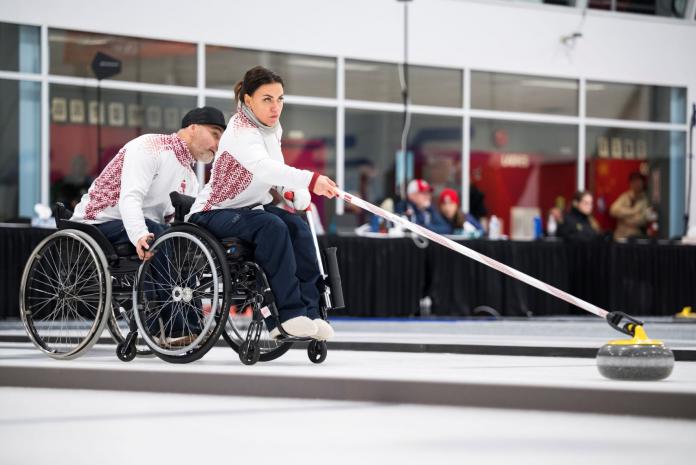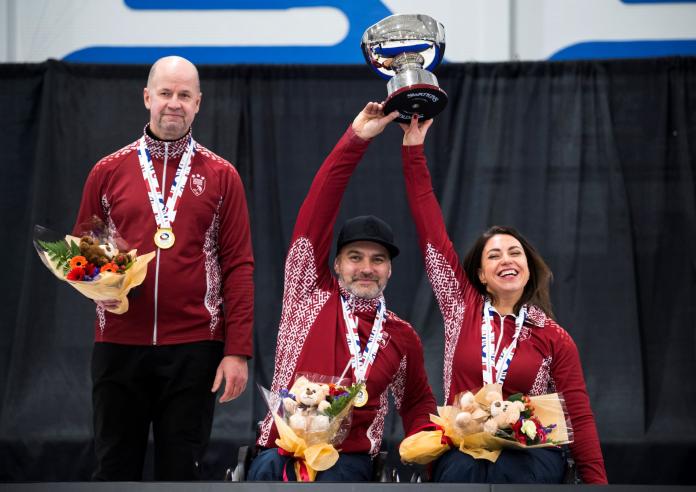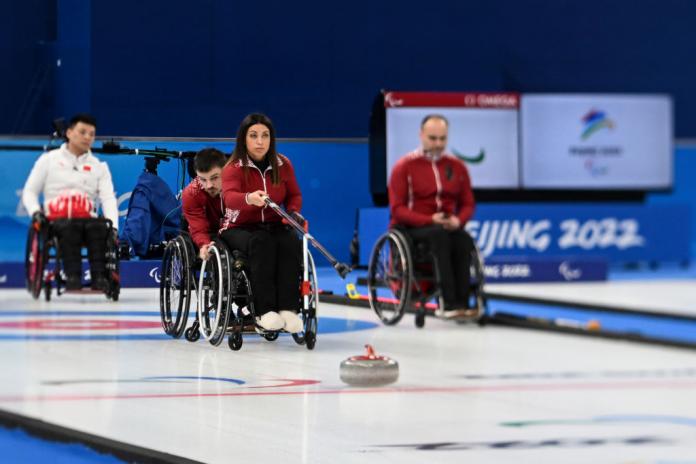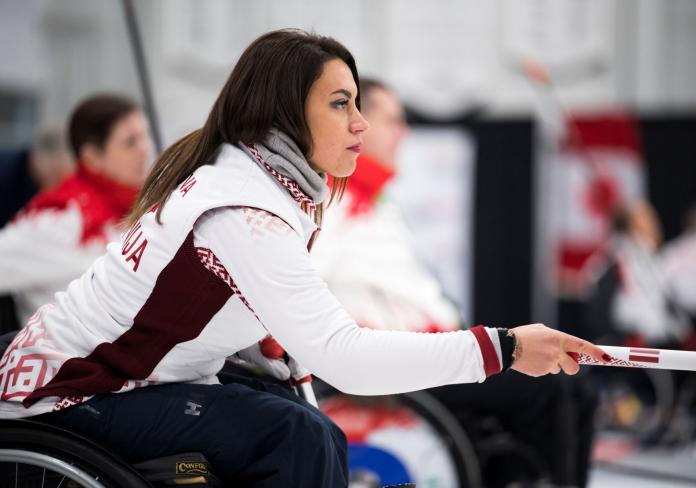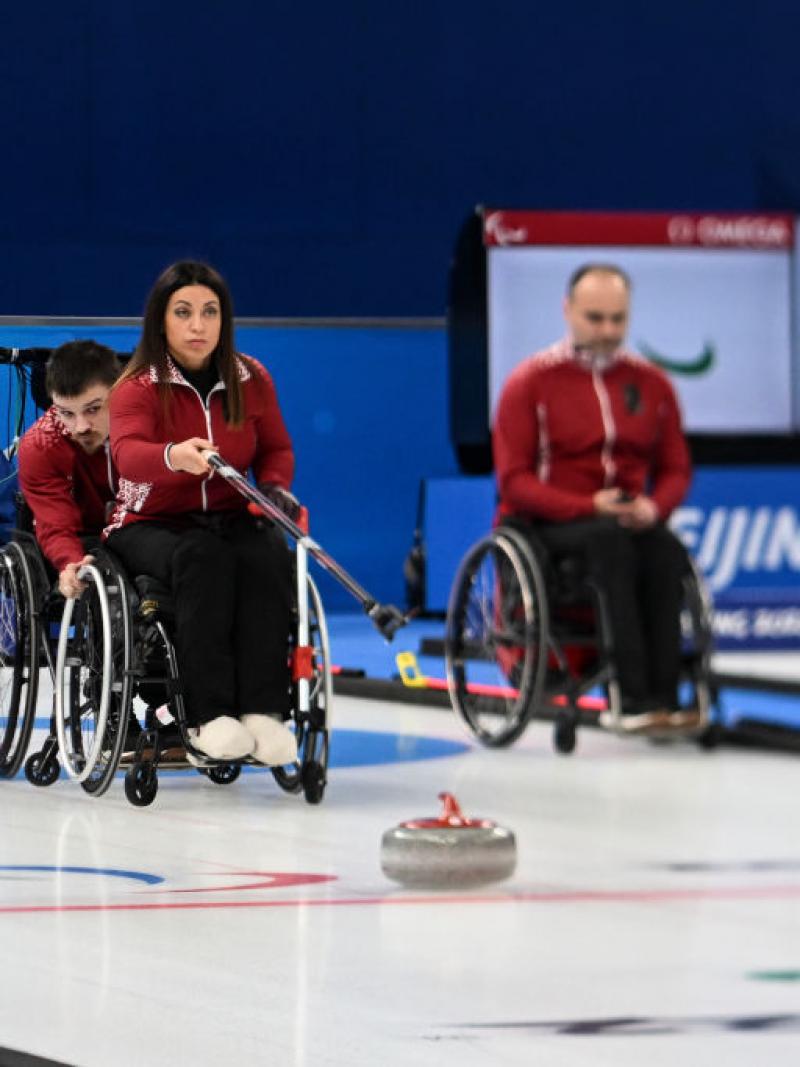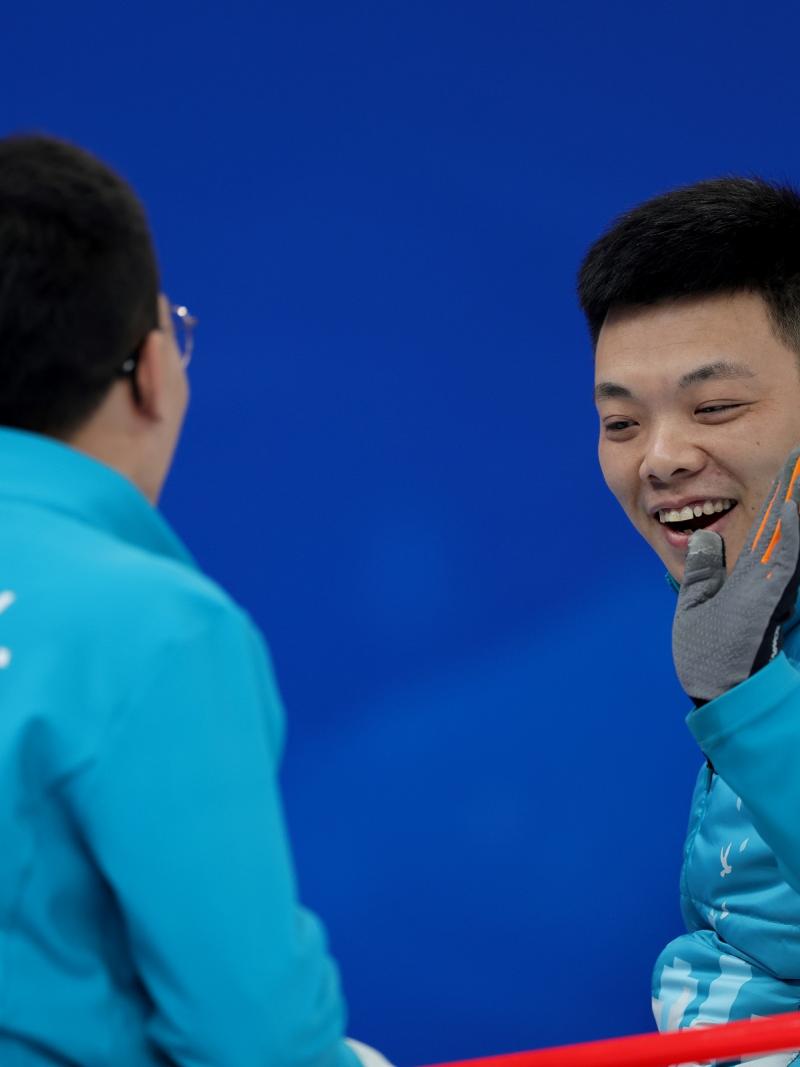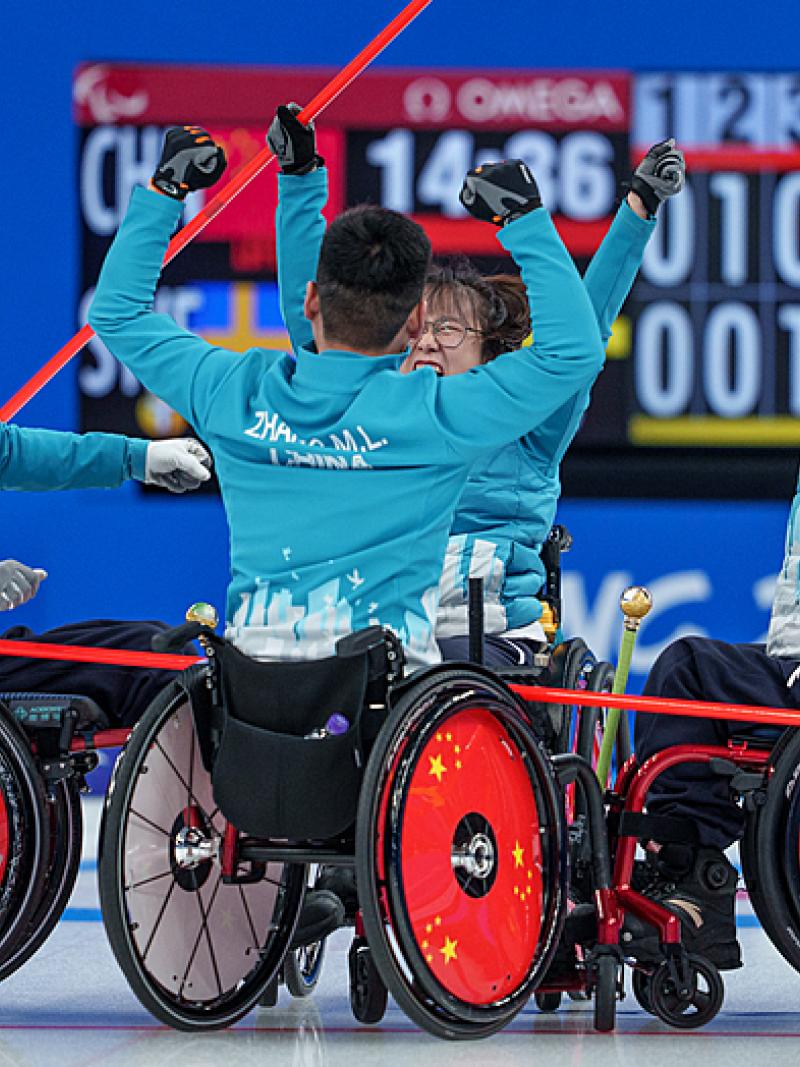Rozkova reflects on milestone at rollercoaster World Wheelchair Curling Championship
Polina Rozkova and Agris Lasmans won the mixed doubles tournament at the 2023 World Wheelchair Curling Championship in March 29 Mar 2023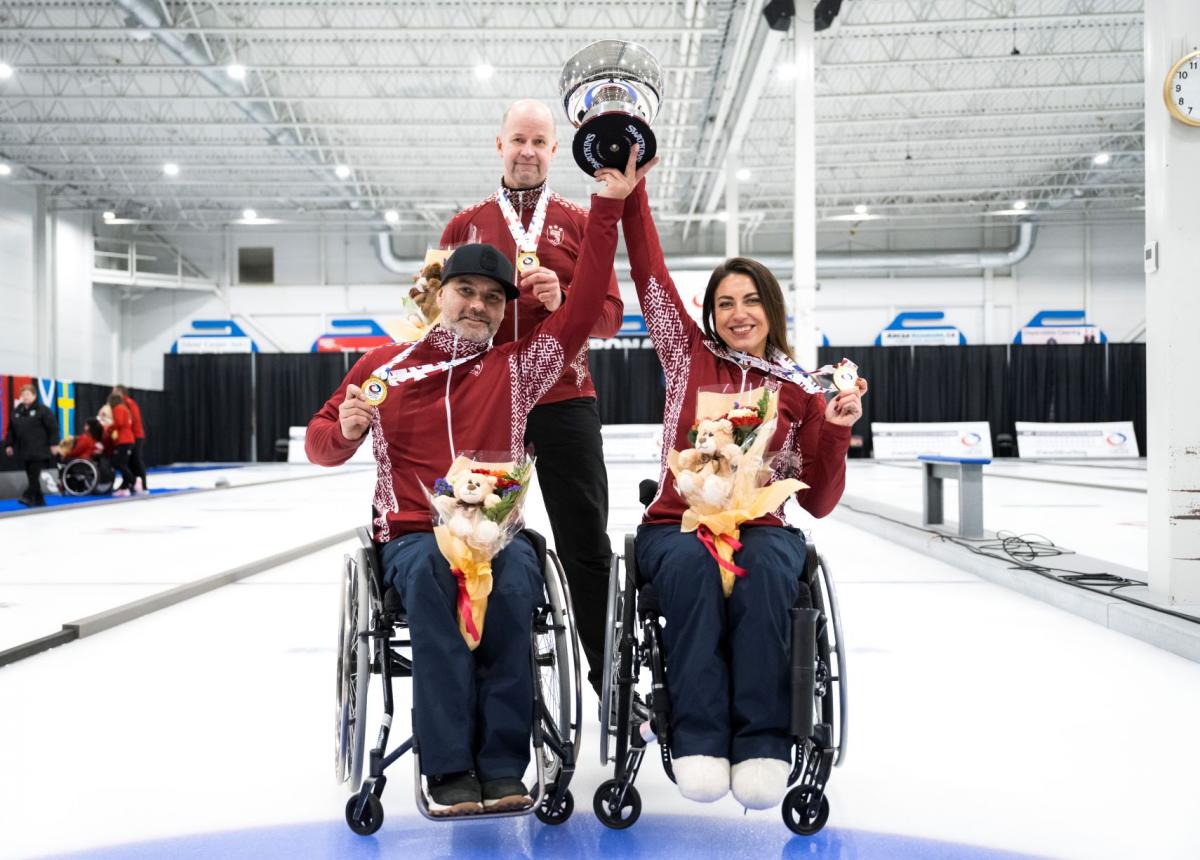
While a picture is worth a thousand words, the photograph of Polina Rozkova and Agris Lasmans smiling with their gold medals at the 2023 World Wheelchair Curling Championship does not fully capture everything that happened during the nine-day tournament.
The Latvian pair defeated Pam Wilson and David Samsa of the United States in a close final in the mixed doubles tournament, which took place between 4 and 12 March in Richmond, Canada.
But winning a world title might not even be the biggest accomplishment in Rozkova’s sports career.
The athlete has led the development of wheelchair curling in Latvia since being introduced to the sport in 2010. She was also the only female skip at Beijing 2022, where Latvia made their Paralympic debut in the sport.
Last-minute change
Even before the World Championship opened at the Richmond Curling Centre, Rozkova felt overwhelmed with all the challenges she faced. In addition to traveling difficulties, Aleksandrs Dimbovskis, who was set to compete in the doubles tournament with her, suffered an injury that forced him to withdraw at the last minute.
Dimbovskis fell from his wheelchair and fractured his legs after arriving in Richmond. This happened just a few days before the tournament, and Rozkova and coach Erkki Lill decided to ask Lasmans, who competed at Beijing 2022, to take Dimbovskis’ place in the competition.
“I have had experience playing with Agris and we played at least something at home. We knew each other so we decided that we can try,” Rozkova recalled. “(Lill and I thought) we can try to do our best from the beginning. Maybe it wasn’t easy for Agris because he was playing third in the bigger team.”
Lasmans also played in the team competition, which meant that he played as many as four games per day, starting his day as early as 9 a.m. and ending as late as 10 p.m.
Picture-perfect moment
Despite the last-minute change, Rozkova and Lasmans won six of their eight matches in the pool stage, before beating Slovakia in the qualification game and China in the semifinals.
Dimbovskis also supported the pair as an assistant coach, giving advice to the duo every step of their campaign.
In the final, Rozkova and Lasmans sealed an 11-8 victory over Wilson and Samsa of the United States. The Latvian duo took an early lead, but the US athletes levelled later in the game to force the extra end.
“When we played against America, we were very calm just because we were so tired. I was like, ‘OK, we are here. Let’s try to play. At least we have one medal so it’s fine’,” Rozkova said.
In the extra end, Latvia had three stones buried behind cover that the US pair failed to reach and ultimately sealed three points to top the podium.
“We were like, ‘Can you believe we are world champions?’ Agris was like, ‘Let’s hug because we are world champions’,” Rozkova said.
“I was so grateful to Agris that he was there on the ice. For me it was important. I think it was the first competition for me during which I gave so much energy and support to others.”
Passion on ice
Rozkova started using a wheelchair after injuring her spine in a snowboarding accident in 2009. She was introduced to wheelchair curling the following year at the rehabilitation centre she visited.
Although she was not interested in the sport itself, Rozkova decided to give it a try because she wanted to meet people who were also using wheelchairs.
“For me it was important to have people similar to me around me,” she said. “But from the first training I really liked going because it was something cute, something interesting, and it looked like I can play even in a wheelchair.”
Twelve years later, Latvia made history at Beijing 2022, competing in the wheelchair curling tournament at a Paralympic Games for the first time. Rozkova was one of the flagbearers for the nation, which participated in their first Paralympic Winter Games since Torino 2006.
While the Games were not the first for Rozkova, who also competed in wheelchair fencing at Rio 2016, she felt great excitement during the Opening Ceremony.
“I had put a lot of energy to be there. The volunteers in Beijing were so nice, so loud. My heart was jumping and everything was positive,” she said. “I want to be in the next Paralympic Winter Games just because I want to feel this again.
“It was unbelievable. It was like drugs for me because it was amazing,” she added with a laugh.
Hosts China, skipped by Wang Haitai, won the mixed team title by defeating Sweden in the final, while Canada captured the bronze medal.
Latvia won four of their 10 pool games and did not advance to the knockout stage.
Developing the sport
There are currently about 15 wheelchair curlers in Latvia, but Rozkova is trying to introduce the sport to more people. This is not an easy task, given how difficult it is for many people who are using wheelchairs to go outside.
“What we don’t have is the option (for wheelchair users) to get out of the flat because most of our buildings are quite old and they aren’t accessible,” Rozkova explained.
“If I’m outside and I see some wheelchair users it’s not a problem for me to go and ask, but it’s so rare.”
There are also challenges related to travelling to the only curling hall in Riga. All the same, Rozkova remains optimistic that there is a bright future for wheelchair curlers in Latvia.
“I think if an athlete wants to have success, then everything is in his hands,” she said. “You can do and work as much as you want.”





